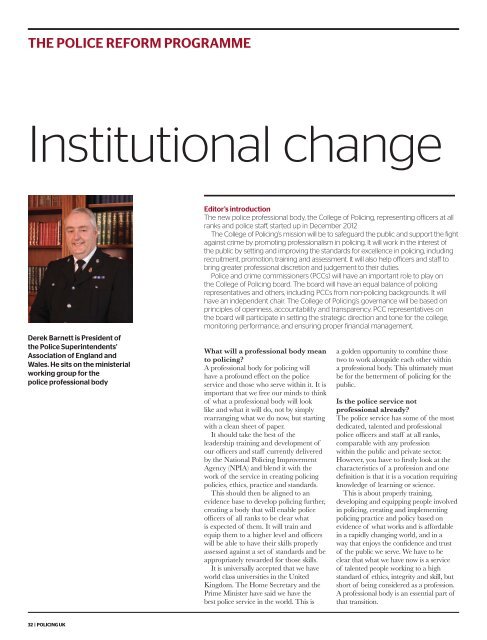Policing UK 2013 - Police Federation
Policing UK 2013 - Police Federation
Policing UK 2013 - Police Federation
You also want an ePaper? Increase the reach of your titles
YUMPU automatically turns print PDFs into web optimized ePapers that Google loves.
THE POLICE REFORM PROGRAMME<br />
Institutional change<br />
Derek Barnett is President of<br />
the <strong>Police</strong> Superintendents’<br />
Association of England and<br />
Wales. He sits on the ministerial<br />
working group for the<br />
police professional body<br />
Editor’s introduction<br />
The new police professional body, the College of <strong>Policing</strong>, representing officers at all<br />
ranks and police staff, started up in December 2012<br />
The College of <strong>Policing</strong>’s mission will be to safeguard the public and support the fight<br />
against crime by promoting professionalism in policing. It will work in the interest of<br />
the public by setting and improving the standards for excellence in policing, including<br />
recruitment, promotion, training and assessment. It will also help officers and staff to<br />
bring greater professional discretion and judgement to their duties.<br />
<strong>Police</strong> and crime commissioners (PCCs) will have an important role to play on<br />
the College of <strong>Policing</strong> board. The board will have an equal balance of policing<br />
representatives and others, including PCCs from non-policing backgrounds. It will<br />
have an independent chair. The College of <strong>Policing</strong>’s governance will be based on<br />
principles of openness, accountability and transparency. PCC representatives on<br />
the board will participate in setting the strategic direction and tone for the college,<br />
monitoring performance, and ensuring proper financial management.<br />
What will a professional body mean<br />
to policing?<br />
A professional body for policing will<br />
have a profound effect on the police<br />
service and those who serve within it. It is<br />
important that we free our minds to think<br />
of what a professional body will look<br />
like and what it will do, not by simply<br />
rearranging what we do now, but starting<br />
with a clean sheet of paper.<br />
It should take the best of the<br />
leadership training and development of<br />
our officers and staff currently delivered<br />
by the National <strong>Policing</strong> Improvement<br />
Agency (NPIA) and blend it with the<br />
work of the service in creating policing<br />
policies, ethics, practice and standards.<br />
This should then be aligned to an<br />
evidence base to develop policing further,<br />
creating a body that will enable police<br />
officers of all ranks to be clear what<br />
is expected of them. It will train and<br />
equip them to a higher level and officers<br />
will be able to have their skills properly<br />
assessed against a set of standards and be<br />
appropriately rewarded for those skills.<br />
It is universally accepted that we have<br />
world class universities in the United<br />
Kingdom. The Home Secretary and the<br />
Prime Minister have said we have the<br />
best police service in the world. This is<br />
a golden opportunity to combine those<br />
two to work alongside each other within<br />
a professional body. This ultimately must<br />
be for the betterment of policing for the<br />
public.<br />
Is the police service not<br />
professional already?<br />
The police service has some of the most<br />
dedicated, talented and professional<br />
police officers and staff at all ranks,<br />
comparable with any profession<br />
within the public and private sector.<br />
However, you have to firstly look at the<br />
characteristics of a profession and one<br />
definition is that it is a vocation requiring<br />
knowledge of learning or science.<br />
This is about properly training,<br />
developing and equipping people involved<br />
in policing, creating and implementing<br />
policing practice and policy based on<br />
evidence of what works and is affordable<br />
in a rapidly changing world, and in a<br />
way that enjoys the confidence and trust<br />
of the public we serve. We have to be<br />
clear that what we have now is a service<br />
of talented people working to a high<br />
standard of ethics, integrity and skill, but<br />
short of being considered as a profession.<br />
A professional body is an essential part of<br />
that transition.<br />
32 | POLICING <strong>UK</strong>
















